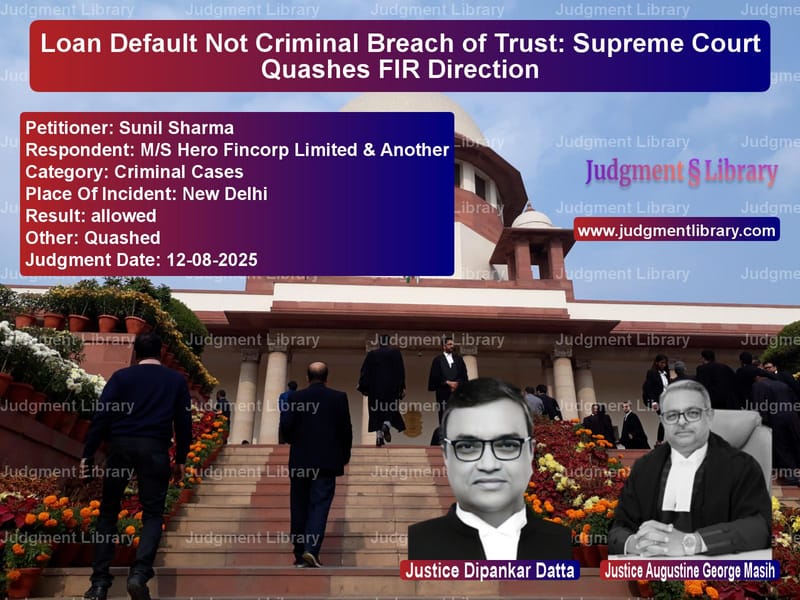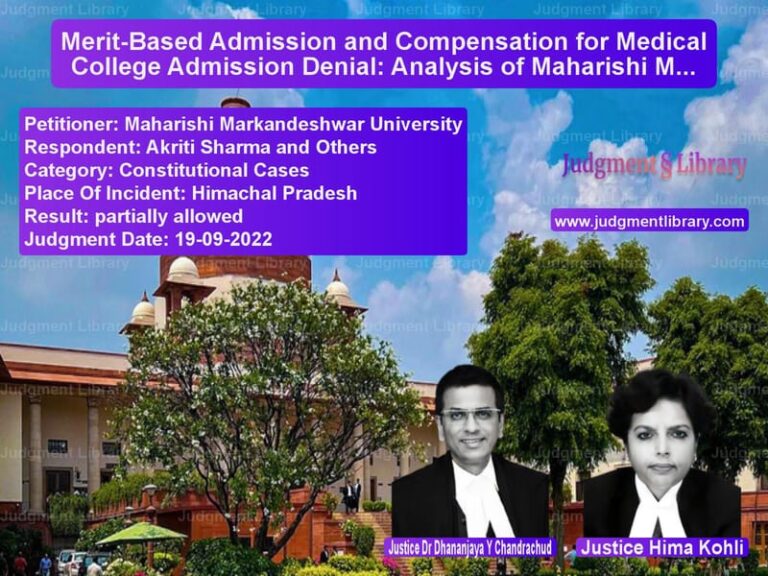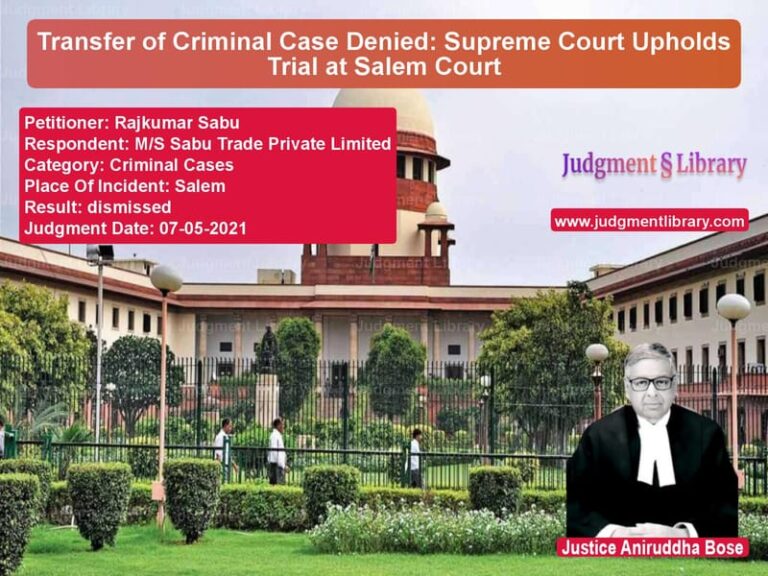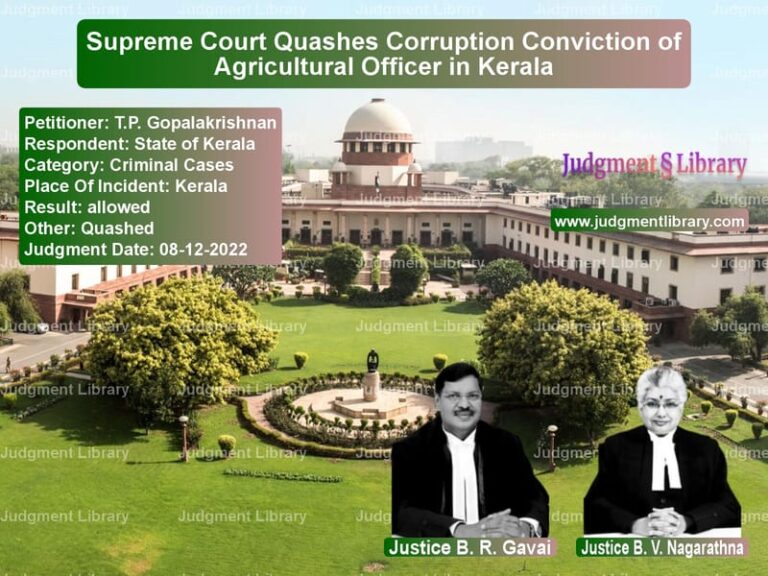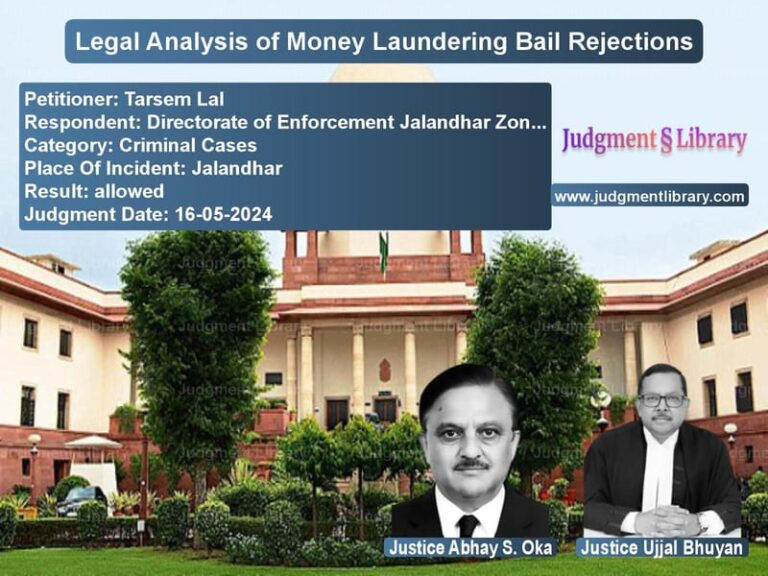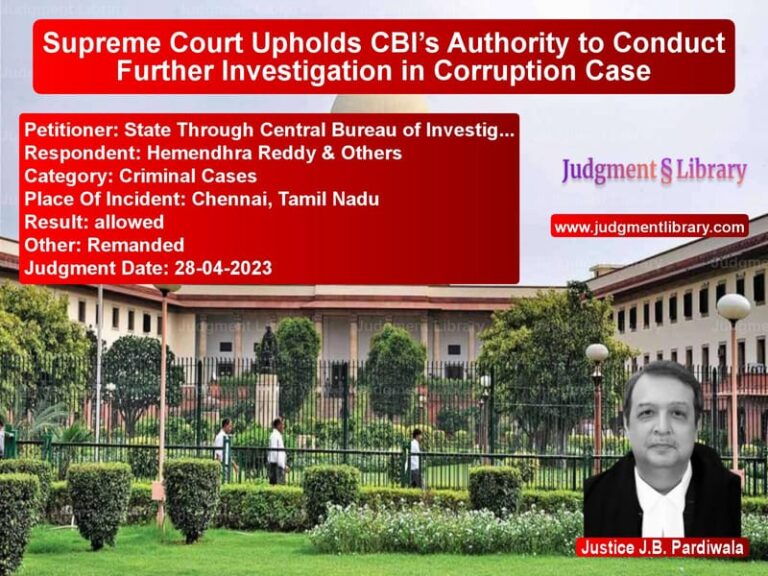Loan Default Not Criminal Breach of Trust: Supreme Court Quashes FIR Direction
In a significant judgment that clarifies the distinction between civil liability and criminal offense in loan transactions, the Supreme Court has set aside the Delhi High Court’s direction to register an FIR against a company director for alleged criminal breach of trust. The case involved Sunil Sharma, a director of M/s Benlon India Ltd., who had been directed to face criminal prosecution by the High Court for allegedly misusing loan funds meant for machinery purchase.
The dispute originated from three loan transactions between Benlon India Ltd. and Hero Fincorp Limited totaling Rs. 37.25 crore. While the first two loans were used for purchasing machinery as intended, a fire incident that destroyed Benlon’s plant just days after the disbursement of the third loan of Rs. 15 crore changed the circumstances dramatically. Despite this setback, Benlon continued making regular payments until May 2018, when insolvency proceedings were initiated against the company by another creditor.
What followed was a multi-pronged legal approach by Hero Fincorp, including 32 complaint cases under the Negotiable Instruments Act, arbitration proceedings, securitization actions, and ultimately a criminal complaint alleging that the loan amount had been misappropriated rather than used for machinery purchase as agreed.
The Economic Offences Wing, after conducting a preliminary inquiry, submitted a detailed Status Report on 28.08.2019 stating that no cognizable offence was made out. The Chief Metropolitan Magistrate agreed with this assessment and rejected the application for FIR registration, instead posting the matter for pre-summoning evidence. However, the Delhi High Court reversed this decision, directing the registration of an FIR against Sunil Sharma, leading to the appeal before the Supreme Court.
The Legal Question
The core legal issue before the Supreme Court was whether the facts disclosed in Hero Fincorp’s complaint revealed the ingredients of criminal breach of trust under Section 405 of the Indian Penal Code, justifying the High Court’s direction for FIR registration.
The Supreme Court meticulously analyzed Section 405 IPC, which defines criminal breach of trust. The Court observed: “It would appear on a bare reading of the above provision that an offence of criminal breach of trust is committed if the accused (i) being entrusted with `property’ or `dominion over property’ (ii) dishonestly misappropriates such property or converts thereof for own use, or, dishonestly uses or disposes of such property (iii) violating any direction of law prescribing the mode in which such trust is to be discharged, or of any legal contract which the accused has made touching the discharge of such trust; or (iv) wilfully suffers any other person to do so.”
The Court emphasized the crucial importance of the term “entrusted” in Section 405, noting that “the word ‘entrusted’ is used, the same implies that there is a trust involving an obligation tied to the ownership of the property.”
Loan Transactions vs. Criminal Breach of Trust
In what becomes the most significant aspect of the judgment, the Supreme Court drew a clear distinction between loan transactions and criminal breach of trust. The Court explained: “The underlying idea which we find in Section 405, IPC is undoubtedly this, that the property, which is entrusted, or in respect of which dominion is passed over, to another person does not even become such person’s property, even temporarily, for him to use as he wishes. Thus, the section would not normally cover the case of a loan where the lender advances money to the borrower who intends to use or utilise the money, for the time being, till he is in possession of it, although he may have to return an equivalent amount later on to the lender with or without interest or compensation for the use thereof.”
This distinction is crucial because in a loan transaction, the beneficial ownership of the money is transferred to the borrower, who is expected to use it, whereas in a trust arrangement, the property does not become the property of the trustee.
The Court further clarified: “Also, when a relation of debtor and creditor is created by a loan transaction and the monies are not repaid according to the terms agreed upon, it gives rise to a civil liability. A criminal liability would arise in addition to the civil liability when all the ingredients of Section 405, IPC are satisfied.”
Application to the Present Case
Applying these legal principles to the facts of the case, the Supreme Court found that “upon the facts as they appear from the record, a relation of debtor and creditor was created between the appellant and Hero, respectively. The beneficial ownership in the money so advanced to Benlon was intended to be transferred to it and it was not intended that it was to keep the money intact in its possession and make no use of it at all, whether or not interest was paid on it. In our opinion, on the plain terms of the loan agreement and the facts that have unfolded, the appellant or, for that matter, Benlon could not be said to have committed any offence.”
The Court also noted the significant circumstance of the fire that destroyed Benlon’s plant, observing that “breach, if any, of the trust had occasioned because Benlon and its directors were forced by circumstances beyond their control not to purchase the machinery owing to the incident of fire which ravaged the plant within a week of receipt of the loan amount and not because the appellant had any dishonest intention of causing wrongful gain to himself and/or wrongful loss to Hero.”
This finding regarding the absence of dishonest intention was crucial since mens rea or guilty mind is an essential ingredient of criminal breach of trust.
High Court’s Error in Applying Lalita Kumari
The Supreme Court found that the High Court had misapplied the Constitution Bench judgment in Lalita Kumari vs. State of Uttar Pradesh. The Court pointed out that “at paragraph ‘120.6’ thereof, one finds enumeration of certain non-exhaustive category of cases in which a preliminary inquiry could be made prior to registration of an FIR based on a complaint that is received in a police station. ‘Commercial offences’ is one such case where preliminary inquiry being permissible, such an inquiry was in fact conducted by the police whereupon a finding was returned of no cognizable offence having been committed.”
The Supreme Court noted that the High Court had failed to examine whether the EOW’s status report suffered from any infirmity and had mechanically directed FIR registration.
Abuse of Process of Law
In a significant observation, the Supreme Court held that “continuance of proceedings before the criminal court now would be an abuse of the process of law. In exercise of the High Court’s power under Section 482, Cr. PC, the petition of Hero ought not to have been accepted.”
This finding is particularly important as it recognizes the growing trend of using criminal proceedings to pressure borrowers in what are essentially civil disputes.
Broader Implications
The judgment has far-reaching implications for the banking and financial sector. It reaffirms the principle that loan defaults, unless accompanied by clear evidence of dishonest intention from the very beginning, should be treated as civil liabilities rather than criminal offenses. This protects genuine borrowers who face unforeseen circumstances from being dragged into criminal proceedings.
The Court’s clarification on the distinction between loan transactions and trust relationships provides much-needed legal certainty. When a bank lends money, it creates a debtor-creditor relationship, not a trustee-beneficiary relationship. The borrower becomes the owner of the money and is expected to use it, unlike in a trust where the trustee cannot use the trust property for personal benefit.
The judgment also underscores the importance of preliminary inquiries in commercial offenses, as recognized in the Lalita Kumari case. When specialized agencies like the Economic Offences Wing conduct thorough investigations and conclude that no offense is made out, courts should be hesitant to override such professional assessments without strong reasons.
Furthermore, the timing of Hero Fincorp’s criminal complaint raised questions. The Court noted that the company had received regular payments for over two years after the fire incident and only initiated criminal action when insolvency proceedings began and payments stopped. This sequence of events suggested that the criminal complaint was more about recovery than about punishing criminal conduct.
The Supreme Court’s decision to set aside the High Court’s direction reinforces the principle that criminal law should not be used as a tool for debt recovery. This is particularly important in the current economic climate where businesses often face genuine difficulties due to factors beyond their control.
In conclusion, the Sunil Sharma vs. Hero Fincorp judgment serves as an important reminder of the distinction between civil wrongs and criminal offenses. It protects borrowers from the threat of criminal prosecution in genuine business failures while ensuring that those with dishonest intent can still be prosecuted under appropriate circumstances. The judgment strikes a careful balance between the interests of lenders and borrowers, ensuring that the criminal justice system is not misused for recovery purposes while maintaining its role in punishing genuinely fraudulent conduct.
Petitioner Name: Sunil Sharma.Respondent Name: M/S Hero Fincorp Limited & Another.Judgment By: Justice Dipankar Datta, Justice Augustine George Masih.Place Of Incident: New Delhi.Judgment Date: 12-08-2025.Result: allowed.
Don’t miss out on the full details! Download the complete judgment in PDF format below and gain valuable insights instantly!
Download Judgment: sunil-sharma-vs-ms-hero-fincorp-lim-supreme-court-of-india-judgment-dated-12-08-2025.pdf
Directly Download Judgment: Directly download this Judgment
See all petitions in Fraud and Forgery
See all petitions in Debt Recovery
See all petitions in Contract Disputes
See all petitions in Banking Regulations
See all petitions in Judgment by Dipankar Datta
See all petitions in Judgment by Augustine George Masih
See all petitions in allowed
See all petitions in Quashed
See all petitions in supreme court of India judgments August 2025
See all petitions in 2025 judgments
See all posts in Criminal Cases Category
See all allowed petitions in Criminal Cases Category
See all Dismissed petitions in Criminal Cases Category
See all partially allowed petitions in Criminal Cases Category

